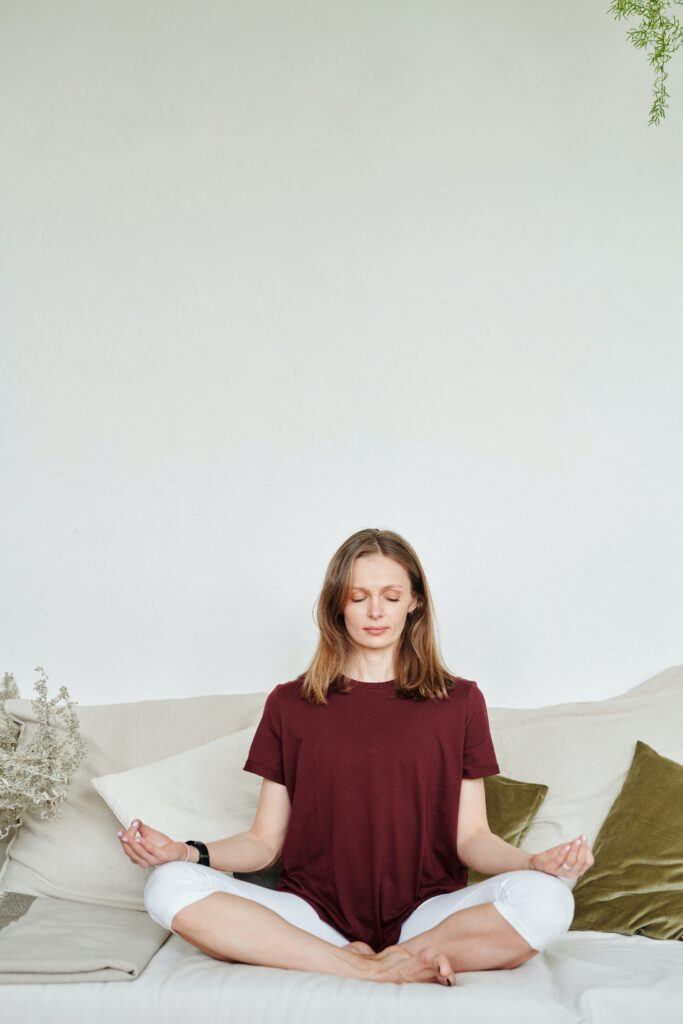
Introduction: In today’s fast-paced and demanding world, stress has become a prevalent challenge that affects our overall well-being. In this article on meditation for beginners we find that meditation offers a powerful tool for combating stress and finding inner peace. By quieting the mind, focusing on the present moment, and cultivating a state of deep relaxation, meditation provides a sanctuary from the chaos of daily life. In this article, we will explore the benefits of meditation for stress relief and delve into various techniques that can help you navigate and alleviate the pressures of daily stressors. Whether you are new to meditation or have some experience, these practices will guide you in harnessing the transformative power of meditation to create a calmer and more balanced life.
- Understanding Stress and its Impact: Stress is the body’s response to external pressures, challenges, or threats. While some stress can be beneficial, chronic or excessive stress can have detrimental effects on our physical, mental, and emotional well-being. Prolonged exposure to stress can lead to anxiety, burnout, weakened immune function, and various health issues. Recognizing the impact of stress on our lives is the first step in seeking effective ways to manage and reduce it.
- The Science Behind Meditation and Stress Relief: Scientific research has shown that meditation can have a profound impact on reducing stress levels. When we meditate, the body’s stress response is counteracted, and the relaxation response is activated. This shift in the body’s physiological state leads to decreased heart rate, blood pressure, and cortisol (stress hormone) levels. Additionally, regular meditation practice strengthens the prefrontal cortex, the part of the brain responsible for decision-making and emotional regulation, thereby enhancing our ability to cope with stress more effectively.
- Mindfulness Meditation: Mindfulness meditation is a popular and accessible technique for stress relief. It involves paying non-judgmental attention to the present moment. Find a quiet space, sit comfortably, and close your eyes. Focus your attention on your breath, observing the sensations of inhalation and exhalation. When thoughts or distractions arise, gently acknowledge them without judgment and bring your focus back to the breath. Mindfulness meditation helps create a space of mental clarity, enabling you to observe and detach from stressful thoughts and emotions.
- Loving-Kindness Meditation: Loving-kindness meditation, also known as metta meditation, is a practice that cultivates feelings of love, compassion, and goodwill towards oneself and others. Find a comfortable position, close your eyes, and take a few deep breaths to centre yourself. Begin by silently repeating phrases such as “May I be happy, may I be healthy, may I be at peace.” After generating a sense of loving-kindness towards oneself, extend these wishes to loved ones, acquaintances, and eventually all beings. Loving-kindness meditation fosters a shift in perspective and promotes empathy and understanding, which can help alleviate the stress caused by interpersonal conflicts and self-criticism.

- Guided Visualization: Guided visualization is a technique that utilizes the power of imagination to create a sense of calm and inner peace. Find a quiet and comfortable space, close your eyes, and listen to a guided visualization recording or use a meditation app. Allow yourself to be guided through vivid imagery of a serene and peaceful setting, such as a beach or a forest. Engage your senses and immerse yourself in the scene, visualizing the sights, sounds, smells, and sensations. Guided visualization provides a mental escape from stressors and helps induce a state of deep relaxation.
- Body Scan Meditation: Body scan meditation is a technique that involves bringing awareness to different parts of the body, systematically releasing tension and promoting relaxation. Find a comfortable position, either sitting or lying down, and close your eyes. Begin by directing your attention to your toes and slowly moving up through each body part, noticing any areas of tension, discomfort, or sensation. As you encounter areas of tension, consciously release the tension with each exhale, allowing the muscles to relax and soften. This practice promotes body awareness, relaxation, and a sense of grounding in the present moment.
- Breathing Techniques: Focused breathing techniques are highly effective for calming the mind and reducing stress. One simple technique is diaphragmatic breathing, also known as belly breathing. Find a comfortable position and place one hand on your abdomen. Inhale deeply through your nose, allowing your abdomen to expand, and then exhale slowly through your mouth, feeling your abdomen gently contract. Repeat this pattern for several breaths, focusing on the sensation of the breath entering and leaving your body. Another technique is box breathing, which involves inhaling, holding the breath, exhaling, and holding again, each for an equal count of seconds. These breathing techniques activate the body’s relaxation response, promoting a sense of calm and reducing stress levels.
- Incorporating Meditation into Daily Life: To maximize the stress-relieving benefits of meditation, it’s beneficial to incorporate it into your daily routine. Carve out dedicated time each day for meditation, whether it’s in the morning, during a lunch break, or before bed. Start with just a few minutes and gradually increase the duration as you become more comfortable. Consistency is key, so aim to practice meditation every day, even if it’s for a short period. Additionally, consider integrating mindfulness into daily activities such as eating, walking, or doing chores. By bringing present-moment awareness to these activities, you infuse them with a sense of mindfulness and reduce stress by focusing on the task at hand.
- Cultivating Self-Compassion: In times of stress, it’s essential to cultivate self-compassion. Treat yourself with kindness and understanding, recognizing that stress is a normal part of life. When practising meditation, approach it with a gentle and non-judgmental attitude. Be patient with yourself, knowing that meditation is a skill that develops over time. If your mind wanders or you feel restless during meditation, simply acknowledge it without self-criticism and gently bring your attention back to the present moment. By cultivating self-compassion, you create an environment of acceptance and support that can help alleviate stress and foster a sense of inner peace.
 Conclusion: Incorporating meditation into your daily routine is a powerful and accessible way to reduce stress and cultivate inner peace. Whether you choose mindfulness meditation, loving-kindness meditation, guided visualization, body scan meditation, or breathing techniques, each practice offers unique benefits for stress relief. By committing to regular meditation practice and integrating mindfulness into daily life, you can develop the tools and skills needed to navigate and alleviate the pressures of stress. Embrace the transformative power of meditation and embark on a journey towards a calmer and more balanced life.
Conclusion: Incorporating meditation into your daily routine is a powerful and accessible way to reduce stress and cultivate inner peace. Whether you choose mindfulness meditation, loving-kindness meditation, guided visualization, body scan meditation, or breathing techniques, each practice offers unique benefits for stress relief. By committing to regular meditation practice and integrating mindfulness into daily life, you can develop the tools and skills needed to navigate and alleviate the pressures of stress. Embrace the transformative power of meditation and embark on a journey towards a calmer and more balanced life.





